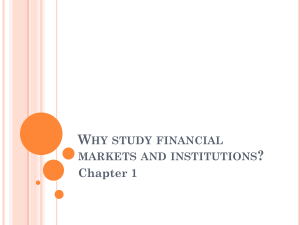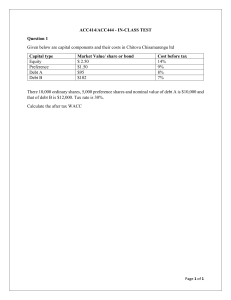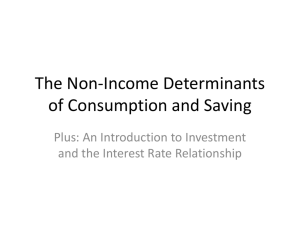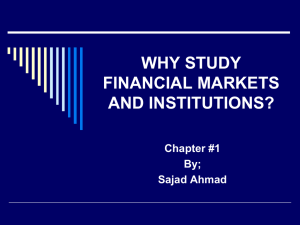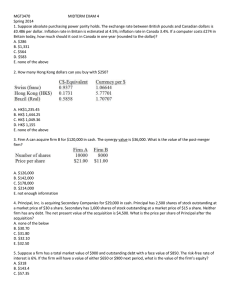Why study financial markets and institutions?
advertisement
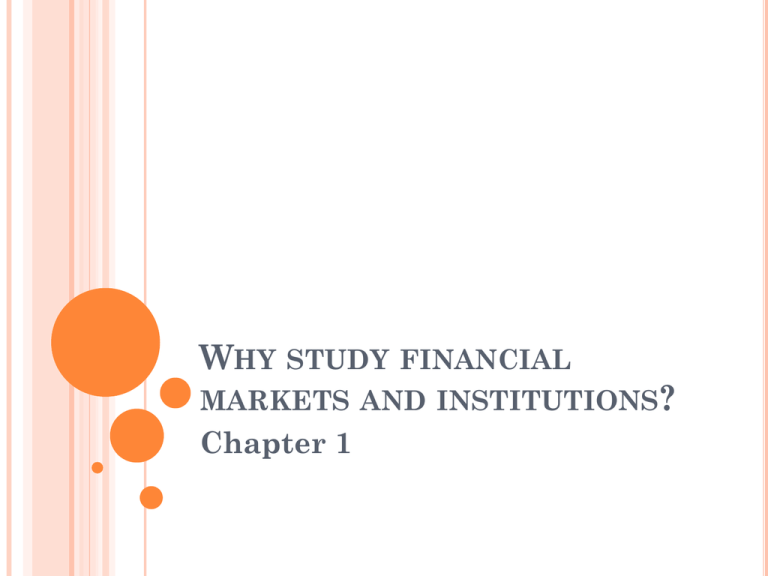
WHY STUDY FINANCIAL MARKETS AND INSTITUTIONS? Chapter 1 FINANCIAL MARKETS Funds are transferred from people with excess funds to those with shortage Promotes greater economic efficiency by providing productive use for funds FINANCIAL MARKETS Well-functioning markets produce higher economic growth Has effects on personal wealth, behaviour of businesses and consumers Cyclical performance of the economy SECURITY Also called financial instrument Claim on issuer’s future income or assets (any financial claim or piece of property that is subject to ownership) DEBT MARKETS AND INTEREST RATES Bond is a debt security that promises to make payments periodically for a specified period of time Also known as bond market DEBT MARKETS AND INTEREST RATES Enable government and corporations to borrow to finance their activities Where interest rates are determined Interest rate is the cost of borrowing or price paid for rental funds DEBT MARKETS AND INTEREST RATES There are many different types of market interest rates, including mortgage rates, car loan rates, credit card rates, etc. Interest levels rates are important at different DEBT MARKETS AND INTEREST RATES On personal level, high interest rates deter from spending but motivates savings High interest rates might postpone businesses’ investment decisions DEBT MARKETS AND INTEREST RATES Because changes in interest rates have important effects on individuals, financial institutions, businesses and overall economy it is important to explain fluctuations in interest rates THE STOCK MARKET A common stock represents a share of ownership in a corporation Has claim on the earnings and assets of the corporation In stock market, shares of stock are traded THE STOCK MARKET Fluctuations in stock prices affect the size of people’s wealth and affect their willingness to spend Impact Price business investment decisions of shares affects the amount of funds that can be raised by selling newly issued stock to finance investment spending THE FOREIGN EXCHANGE MARKET Conversion of one currency into another for moving funds between countries takes place Change in exchange rate affects the cost of imports and revenue from exports WHY STUDY FINANCIAL MARKETS? Financial markets, such as bond and stock markets, are crucial in our economy. These markets channel funds from savers to investors, thereby promoting economic efficiency. Market activity affects personal wealth, the behavior of business firms, and economy as a whole WHY STUDY FINANCIAL MARKETS? Well functioning financial markets, such as the bond market, stock market, and foreign exchange market, are key factors in producing high economic growth. WHY STUDY FINANCIAL INSTITUTIONS? Financial Institutions are the institutions that make financial markets work “Financial Institutions are the intermediaries, that take funds from the people who save and lend it to people who have productive investment opportunities”.
